#Textile Rolling Machine
Explore tagged Tumblr posts
Text
“By 1900 child mortality was already declining—not because of anything the medical profession had accomplished, but because of general improvements in sanitation and nutrition. Meanwhile the birthrate had dropped to an average of about three and a half; women expected each baby to live and were already taking measures to prevent more than the desired number of pregnancies. From a strictly biological standpoint then, children were beginning to come into their own.
Economic changes too pushed the child into sudden prominence at the turn of the century. Those fabled, pre-industrial children who were "seen, but not heard," were, most of the time, hard at work—weeding, sewing, fetching water and kindling, feeding the animals, watching the baby. Today, a four-year-old who can tie his or her own shoes is impressive. In colonial times, four-year-old girls knitted stockings and mittens and could produce intricate embroidery; at age six they spun wool. A good, industrious little girl was called "Mrs." instead of "Miss" in appreciation of her contribution to the family economy: she was not, strictly speaking, a child.
But when production left the houschold, sweeping away the dozens of chores which had filled the child's day, childhood began to stand out as a distinct and fascinating phase of life. It was as if the late Victorian imagination, still unsettled by Darwin's apes, suddenly looked down and discovered, right at knee-level, the evolutionary missing link. Here was the pristine innocence which adult men romanticized, and of course, here, in miniature, was the future which today's adult men could not hope to enter in person. In the child lay the key to the control of human evolution. Its habits, its pastimes, its companions were no longer trivial matters, but issues of gravest importance to the entire species.
This sudden fascination with the child came at a time in American history when child abuse—in the most literal and physical sense—was becoming an institutional feature of the expanding industrial economy. Near the turn of the century, an estimated 2,250,000 American children under fifteen were full-time laborers—in coal mines, glass factories, textile mills, canning factories, in the cigar industry, and in the homes of the wealthy—in short, wherever cheap and docile labor could be used. There can be no comparison between the conditions of work for a farm child (who was also in most cases a beloved family member) and the conditions of work for industrial child laborers. Four-year-olds worked sixteen-hour days sorting beads or rolling cigars in New York City tenements; five-year-old girls worked the night shift in southern cotton mills.
So long as enough girls can be kept working, and only a few of them faint, the mills are kept going; but when faintings are so many and so frequent that it does not pay to keep going, the mills are closed.
These children grew up hunched and rickety, sometimes blinded by fine work or the intense heat of furnaces, lungs ruined by coal dust or cotton dust—when they grew up at all. Not for them the "century of the child," or childhood in any form:
The golf links lie so near the mill
That almost every day
The laboring children can look out
And see the men at play.
Child labor had its ideological defenders: educational philosophers who extolled the lessons of factory discipline, the Catholic hierarchy which argued that it was a father's patriarchal right to dispose of his children's labor, and of course the mill owners themselves. But for the reform-oriented, middle-class citizen the spectacle of machines tearing at baby flesh, of factories sucking in files of hunched-over children each morning, inspired not only public indignation, but a kind of personal horror. Here was the ultimate "rationalization" contained in the logic of the Market: all members of the family reduced alike to wage slavery, all human relations, including the most ancient and intimate, dissolved in the cash nexus. Who could refute the logic of it? There was no rationale (within the terms of the Market) for supporting idle, dependent children. There were no ties of economic self-interest to preserve the family. Child labor represented a long step toward that ultimate "anti-utopia" which always seemed to be germinating in capitalist development: a world engorged by the Market, a world without love.”
-Barbara Ehrenreich and Deirdre English, For Her Own Good: 150 Years of the Experts’ Advice to Women
537 notes
·
View notes
Text
Newsies AU where it's 1899 but none of the boys are newsies; they have other period-appropriate jobs instead.
Jack is a stableboy. He mucks out the stalls and sings to the horses while he brushes them.
Crutchie is a bootblack, so he doesn't have to walk too much.
Albert is a telegraph messenger. His crew is feuding with the Western Union messengers, who knock them off their bikes when they see them.
Buttons and Finch both work in a textile factory. Finch is always getting in trouble for going too slow. Last year, Buttons caught two fingers on his right hand in a machine and lost them, but he's healed up now and is faster than Finch again.
Elmer helps his ma and siblings roll cigarettes in their tenement.
Mush repairs shoes.
Romeo works at a laundry next to a brothel. All the ladies are really nice to him when they see him.
Specs is the lookout for a gang of older boys who are housebreakers. They give him a cut of their take. He has been in the Refuge six times.
Jojo is apprenticed to an illiterate jeweler, and does the books. His boss beats him if he thinks he's made a mistake.
Racetrack is an oyster shucker. He has never seen a pearl.
Albert seems to know everyone in Lower Manhattan, but most of the other boys are lonely. Buttons and Finch aren't allowed to talk at work. Kids steer clear of Specs. Crutchie once saved Romeo from getting soaked by some toughs and now he sometimes says hi when he sees Crutchie set up on the corner, but none of the rest of them are even friends.
#history is depressing#idk whats wrong with me#newsies#livesies#newsies au#newsies fanfiction#child labor au#bonnie's newsies aus#newsies headcanons
245 notes
·
View notes
Text
Art References for Chapter One of underneath the sunrise (show me where your love lies)
(aka this is the nerdiest thing I've done for this fandom)
Landscape with the Fall of Icarus, Pieter Bruegel the Elder, c. 1560
"Monty didn’t know what it felt like to fly through the air, the wind between your wings, the sun kissing your skin, until now. He didn’t know what it felt like for the wax to burn away and melt itself into your skin, searing your flesh, until now.
And he didn’t know why anyone would risk such a thing until now.
Until them."
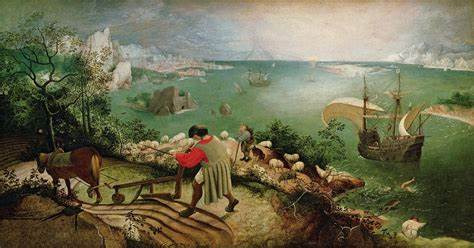
The Two Fridas, Frida Kahlo, 1939
"How the fuck is Monty supposed to reply when he finally has the thing that he’s ached for so long and he can’t even enjoy it? When his heart is ratcheting up his throat, a ticking time bomb that Frida Kahlo would adore?"
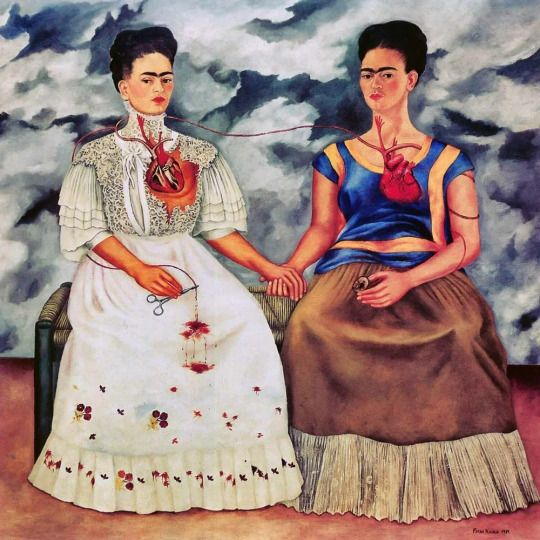
Garden of Earthly Delights, Hieronymous Bosch, 1490-1510
"Monty is being torn apart in the hell panel of the Garden of Earthly Delights. He is some abomination that Bosch dreamed up to fill the inferno, to be tortured for all eternity, because both of the only two things that Monty has ever loved are being ripped from his trembling fingers by his mother and used against him, just because she can’t handle the fact that he wanted something, anything, to call his own."

Textiles of South Asia (Fictional Exhibit, but here are photos of the clothing in question)
"But mostly, Monty spent his time drinking in Edwin’s knowledge, the way that that he went into professor-mode when explaining the symbolism behind certain artworks. Monty devoured the bits about artwork that Charles knew about, like a discussion in the Textiles of Southern Asia special exhibit where Monty had the privilege of seeing Charles get excited explaining the differences and purposes of lehengas and saris and sherwanis. The way that though they were surrounded by masterpieces, all Monty could stare at is the two muses in the middle of the room, holding hands, more breathtakingly beautiful than any of the painting surrounding them."
Lehenga

Sari (Maharashtraian sari)
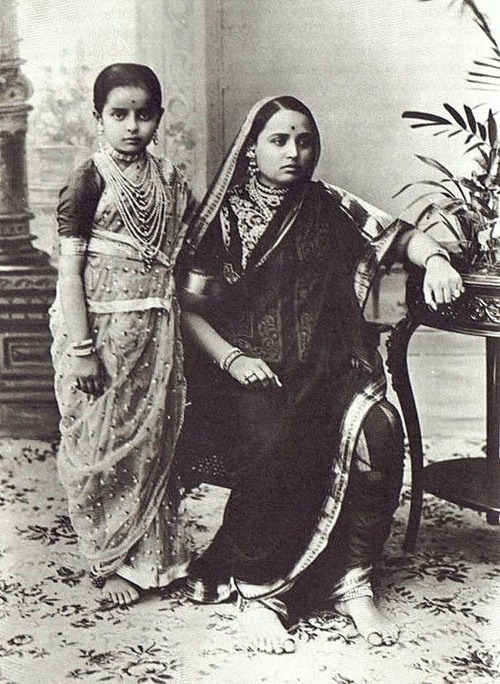
Sherwani (Painting of the last Nizam of Hyderabad)
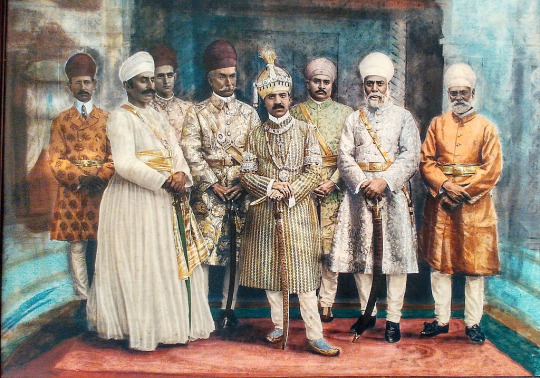
Snow Storm, J. M. W. Turner, 1842
"His fingers catch under Monty’s jaw, guiding Monty’s mouth to his like a brushstroke of lightning hitting the mast of a J. M. W. Turner ship, all storm, all sensation"

I will post another archival set for chapter 2- we've got plenty more coming!
@deadboy-edwin @icecreambrownies @anonymousbooknerd-universe @ashildrs
@tragedy-machine @just-existing-as-you-do-blog @orpheusetude @mj-irvine-selby
@pappelsiin @itsbitmxdinhere @rexrevri @sweet-like-h0ney-lavender @saffirez
@the-ipre @sunnylemonss @days-light @agentearthling @helltechnicality
@sethlost @catboy-cabin @secretlyafiveheadeddragon @vyther15
@anything-thats-rock-and-roll @queen-of-hobgobblers @every-moment-a-different-sound
@nix-nihili @mellxncollie @tumblerislovetumblerislife @lemurafraidofthunder
@likemmmcookies @wr0temyway0ut
#art history references#listen this is so niche#dead boy detectives#monty the crow#monty finch#edwin payne#charles rowland#ghostcrow#cricketcrow#montwin#fanfic#my fics#aletterinthenameofsanity#ao3#frida kahlo#j m w turner#pieter bruegel the elder#icarus#hieronymous bosch#didn't know they were dating au#art references
30 notes
·
View notes
Text
Saw a post earlier where someone was talking about the joys of doing crafts/textile/fibre art and it made me want to maybe pick up embroidery again and maybe commit to learning to crochet more than just a granny square (perhaps finish the shawl I started 3 years ago lol) but it's also go me waxing poetic a bit about crafts and fibre arts specifically like I sit and do my little needlepoint and am reminded of the generations of women and others that came before me who also sat and drank tea while doing their needlepoint as well. I wonder how many hands have made these same movements done, these same stitches, stopped to take a break and brew some more tea to let the warmth of the mug warm their hands. I am reminded of sitting on my grandma Margarets rug by my mom's feet as she crocheted/sewed late into the evening, the sound of the sewing machine or crochet hooks clacking softly in the background as she explains how to turn the fabric to get the stitches just so or how to maintain good yarn tension without holding too tightly while handing me a skein of yarn to roll into a ball to keep my hands busy and when I tired of that handing me a soft ball of yarn and a crochet hook to practice doing chains of whatever stitch she had shown me that struck my fancy at the time. I wonder how many children through the ages have fallen asleep to the soft sounds of someone lovingly making something soft and warm, how many little hands have wound up balls of yarn while sitting by their mother's feet as I did.
17 notes
·
View notes
Photo

The Impact of the British Industrial Revolution
The consequences of the British Industrial Revolution (1760-1840) were many, varied, and long-lasting. Working life in rural and urban settings was changed forever by the inventions of new machines, the spread of factories, and the decline of traditional occupations. Developments in transportation and communications meant life in the post-industrial world was more exciting and faster, with people more connected than ever before. Consumer goods became more affordable to more people, and there were more jobs for a booming population. The price to pay for progress was often a working life that was noisy, repetitive, and dangerous, while cities grew to become overcrowded, polluted, and crime-ridden.
The impact of the Industrial Revolution included:
Many new machines were invented that could do things much faster than previously or could perform entirely new tasks.
Steam power was cheaper, more reliable, and faster than more traditional power sources.
Large factories were established, creating jobs and a boom in cotton textile production, in particular.
Large engineering projects became possible like iron bridges and viaducts.
Traditional industries like hand weaving and businesses connected to stagecoaches went into terminal decline.
The cost of food and consumer goods was reduced as items were mass-produced and transportation costs decreased.
Better tools became available for manufacturers and farmers.
The coal, iron, and steel industries boomed to provide fuel and raw materials for machines to work.
The canal system was expanded but then declined.
Urbanisation accelerated as labour became concentrated around factories in towns and cities.
Cheap train travel became a possibility for all.
Demand for skilled labour, especially in textiles, decreased.
Demand for unskilled labour to operate machines and work on the railways increased.
The use of child and women labour increased.
Worker safety declined and was not reversed until the 1830s.
Trade unions were formed to protect workers' rights.
The success of mechanisation led to other countries experiencing their own industrial revolutions.
Coal Mining
Mining of tin and coal has a long history in Britain, but the arrival of the Industrial Revolution saw unprecedented activity underground to find the fuel to feed the steam-powered machines that came to dominate industry and transport. The steam-powered pump was invented to drain mines in 1712. This allowed deeper mining and so greatly increased coal production. The Watt steam engine, patented in 1769, allowed steam power to be harnessed for almost anything, and as the steam engines ran on coal, so the mining industry boomed as mechanisation swept across industries of all kinds. This phenomenon only increased with the spread of the railways from 1825 and the increase in steam-powered ships from the 1840s. Coal gas, meanwhile, was used for lighting homes and streets from 1812, and as a source of heat for private homes and cookers. Coke, that is burnt coal, was used as a fuel in the iron and steel industries, and so the demand for coal kept on growing as the Industrial Revolution rolled on.
There were four principal coal mining areas: South Wales, southern Scotland, Lancashire, and Northumberland. To get the coal to where it was needed, Britain's canal system was significantly expanded as transportation by canal was 50% cheaper than using roads. By 1830, "England and Wales had 3,876 miles in 1760" (Horn, 17). Britain produced annually just 2.5 to 3 million tons of coal in 1700, but by 1900, this figure had rocketed to 224 million tons.
Continue reading...
24 notes
·
View notes
Note
After reading the dorm leaders with a fem reader who's great at textile work made me wonder: How about the vice dormleaders? I'm sure Trey and Ruggie's families would adore her.
I loved writing the first one, so here’s the second part of this! I also rushed this, so I apologize if it’s not the best quality.
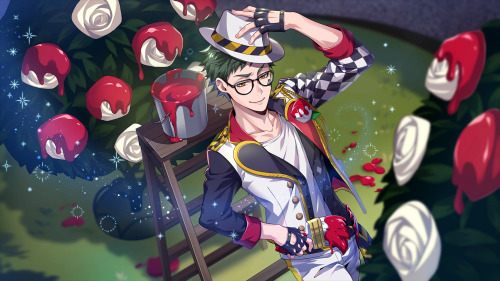
Trey Clover
He is happy that you found your hobby in Twisted Wonderland. Whenever he comes to give you some sweets you baked, you always have a gift for him. It’s become a thing between the two of you that he always looks forward to.
The most memorable thing that you have made him was a quilt you had designed. It had two birds with a heart in between them, and he found it adorable. Whenever he made his bed, he made sure to put the quilt on top of his duvet as a little decorative piece.
You both are artists in your own ways, so it’s an interesting experience when you both try each other’s arts. Neither might come out looking great, but it’s fun for the both of you. The amount of times you would get flustered when he put his hands on yours as he helps you with the rolling pin-
He probably set up an entire shelf in his room dedicated to the things you make for him. He gets embarrassed when you point it out, but you can’t help but be flattered by how he treasures the things you created. You wish you could do the same with his food, but alas: the things he bakes are perishable goods. (He has told his family about you, and they absolutely love you even though they haven’t met you yet)
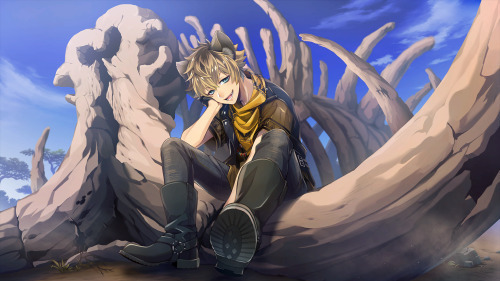
Ruggie Bucchi
If you have a shop open, he will most definitely help you with the packing and shipping process if you need any assistance… just as long as he gets paid for his work. He is a hardworking hyena, and he needs compensation for it!
One day, after you closed up shop, you presented Ruggie with a donut plushie that you had made for him. He found it absolutely adorable, and he makes sure that he puts it in a place where he can view it everyday and be reminded of you.
He doesn’t have any free time, so he doesn’t have the opportunity to try his hand at the type of art you hold dear to your heart. If you gave him more things, he would absolutely cherish every single one of those items.
However, when you do, always make sure you praise him. Pet his ears and call him a good boy, your favorite, whatever. He just soaks. It. Up. He would walk around with a dopey grin all day because of it, alright? Make him feel appreciated. (He has also told his family about you, and they also absolutely adore you even though they haven’t met you yet)
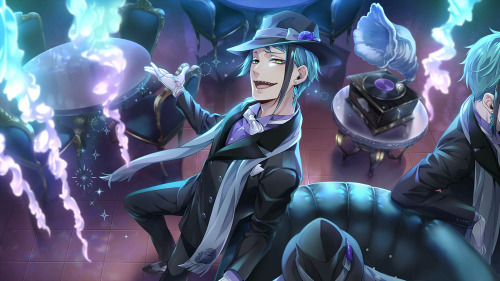
Jade Leech
He finds this hobby of yours quite interesting. You would sit for hours at your sewing machine, just doing what you do best, and it was like you turned the fabric into something that was truly a wonder all on its own.
The item that you made for him that he holds dearest was a mushroom tapestry that you had created. He immediately went to put it up in his room, and he loves to see it whenever he wakes up. You really knew how to bring life to the things you made.
He also doesn’t have much free time, but when he does he has to take care of his plants. When he is finished with that, then he will sit and listen as you explain the current piece you were working on. He held onto each and every word you said.
He does get a bit jealous whenever you make something for someone else, but he knows that it's your way of showing friendly affection. Just make sure to give him attention and love later, otherwise he will ‘cry’ about how you neglected him all day.
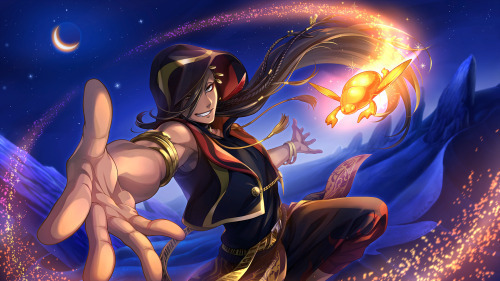
Jamil Viper
He was glad that you weren’t out causing trouble. In fact, when he was younger, he remembers the seamstresses in the streets making rugs and fixing clothes. He always found it fascinating how the technique was all in the hands.
You once made him a dream catcher. He didn’t quite understand until you explained that the Ojibwe Tribe back home believed that these talismans, specifically the bead inside, were supposed to catch the bad dreams and nightmares drifting in the air. Sure, it was more for children, but the concept was adorable.
He most certainly doesn’t have free time, so you are mostly on your own. He wishes he could sit beside you and do some form of textile art as you gently guide his hands, but he simply can’t because he’s too busy being both the Vice Housewarden of Scarabia and a servant to Kalim.
Be sure to assure him that it’s alright. He feels so bad for not making time for you in his already hectic schedule. Just be there for him at night. Run your hands through his unbraided hair and talk to him in a gentle voice. It makes his heart flutter so much.

Rook Hunt
It was interesting because most of the Pomefiore dormitory also took interest in textile art, especially Vil. The poor hunter is always debating as to which is more beautiful. It’s a lot like the story of Athena and Arachne (a story that he himself is unfamiliar with since Greece doesn’t exist in Twisted Wonderland).
His favorite thing that you have made him is a tapestry with a deer as the subject. No, he does not use it as a target. It’s much too beautiful to destroy in such a harsh manner. He hangs it up in his room, just so he can admire it as he falls asleep.
He has some experience with sewing, but you may have to teach him more advanced things. Since his favorite art mediums include photography, he will teach you how to handle a camera in return. He always encourages you when you feel your art isn’t good enough, and you do the same for him.
A lot of Pomefiore students go to you to repair their dorm uniform because they are too scared to ask Vil. Rook knows about it, but doesn’t tell his Housewarden about it. After all, he goes to you as well. It’s not out of fear, but because he loves feeling your hands on him as you gather his measurements and how big the tear is.
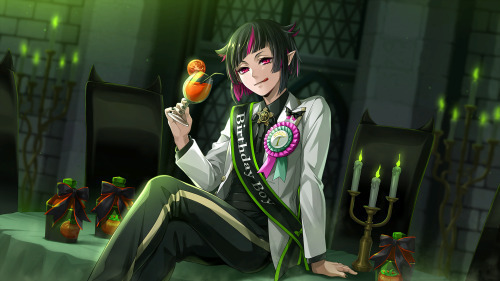
Lilia Vanrouge
He finds it absolutely adorable. Whenever you are able to get your hands on a high-quality ball of yarn or spool of thread, you have this sparkle in your eye that makes the old fae absolutely swoon for you. He doesn’t recall a time where he had ever been this in love with someone before, let alone a human.
He loves everything you make for him, but if he had to choose it would be a plush bat. The irony was absolutely hilarious, so that’s why he likes it so much. He keeps it on his desk whenever he plays video games just so he can be reminded of you.
I feel like he has experience with almost every single medium, but he believes that his art could never compare to yours. Also, he makes you think that he needs help just so he could feel your hands against his; a reminder that you are here with him and this isn’t all a dream.
As the significant other of General Lilia Vanrouge, you are held in high respect around Diasomnia. Even Sebek has to set aside his pride. Both Malleus and Silver see you as their mom, so you might want to get used to being held on such a pedestal. You are probably one of those couples that sit by the fire as you are knitting and he is reading a book, just enjoying the feeling of being in each other’s presence.
#disney twisted wonderland#twst#twisted wonderland x reader#twisted wonderland#disney twst#twst x reader#twst wonderland#twst trey clover#twst trey#trey clover x reader#trey x reader#trey clover#trey#twst trey x reader#ruggie bucchi x reader#ruggie x reader#ruggie bucchi#ruggie#twst ruggie#twst ruggie bucchi#twst ruggie x reader#twst jade leech#jade leech x reader#jade x reader#jade leech#twst jade#twst jade x reader#jamil viper#twst jamil viper#twst jamil
291 notes
·
View notes
Text
Designing Fate - T. Mitsuya
Synopsis: Majority of students join school clubs whether a sport or a something else that is their passion. Both Y/n and Mitsuya are in the same boat, stuck around bothersome teenage girls as they share a table in textiles.
Pairing: Takashi Mitsuya X Female Y/n
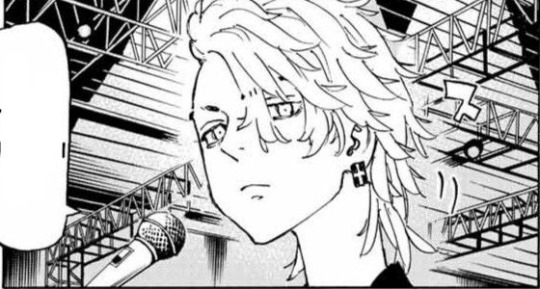
‘A guy?’
A small nod among others, their faces glued to one another. Snapping back and forth perfectly like the evil step sisters they portrayed. Between the five of them gossiping about little things, they used mostly their hands to hide the spiteful things that blurted out of their mouths like some sort of disease.
‘Yeah, that’s what the class roll said when the president looked over it. Thirteen girls, one boy.’
‘One boy?! Jeez he won’t be the looker, any guy who isn’t doing a sport is laughable.’
A small smile perked on your lips, yet they wouldn’t know. The overhanging shadow fallen from your hooding hid every single facial feature except for the white string that fell either side of your face from your headphones. The soft buzz of the beat you knew blew against the stale atmosphere.
‘Alright everyone!’ you heard the club president shout,
You followed the rest of the herd, until your shoulders brushed. Your eyes snapped in confusion yet met with ones that look too relaxed to do anything of the sorts maliciously. His hands were thrown in the pockets of his sweater. He stopped and followed behind you, as you entered the classroom. Majority of the desks were shoved together by groups of friends.
You found the first desk away from anyone, your feet laid upon the desk as you heard the buttons of his jacket hit the edge of the stool as he took a seat beside you. The regular murmur of females giggles and gossip filled the air as they slowly began on whatever little project caught their attention in the first second of even being in class.
Your eyes flickered back to him, from his back he pulled out a jacket that you hadn’t particularly seen before yet only knew the symbol. The fabric was mostly shredded apart from the writing that ran down the sides and on the front breast of it.
‘Tokyo manji?’ you muttered quietly,
You hadn’t faced a member before, yet your brother's fan cries about the juvenile gangs in the area and how they were so subpar from actual yakuzas. He only knew them because he was a yakuza member. His eyes lit up as they snapped towards you, your head leant towards the sky as the hood fell off your head before you stared down once again at the jacket.
‘Yeah how did you know?’ you heard him question,
You smirked softly, ‘my brothers a higher up in an actual yakuza,’
‘Actual?’ he grumbled,
His eyebrows raised, a smirk jerked upon his face as you could see some of his ego was chopped down. You didn’t mean it on purpose as you stared at him with a smile,
‘I mean he isn’t a boy riding around his mates.’
You heard his soft chuckle, strung between a man’s ego being knocked off its pedestal and actually finding it funny. He scratched his neck, you slowly held the fabric so it would bulge as it went through the sewing machine. Your eyes snapped, the faces of horrid little witches giggling as their heads snapped back to the front where they should have been originally.
‘There’s a meet up tonight,’ he paused, ‘How about you-’
You grimmed and placed your hoodie upon your head, covering your face once again, ‘So not even one lesson in and you already invited me on a date.’
He chuckled and nodded,
‘Well sure, prove me wrong.’ you chuckled,
Your arms wrapped around yourself, the jumper was beginning to grow thin as the wind snapped passed. The large mountain of bikes lined in a row made you think you were in the right place. You watched footmen walk up the stairs of an old temple. The thud was the first thing you heard before you felt it. It impressed upon your shoulders as a gasp of a breath escaped your lips.
The black jacket laid upon your shoulders, your eyes turned towards the owner of the jacket. He had a peculiar soft smile upon his face.
‘Thought you were a smart girl, it’s winter and it gets cold.’
Your eyes rolled, as his hands dropped from your shoulders and slacked into his pockets. Your eyes darted to the other men, in your arm closest to him you link arms the other trailing to your side. You walked up the steps and to find the crowd of men, they were laughing and playing with one another.
You rolled your eyes and kept glued to his side, his friends eyes popping wide made you smile. His hand pulled your hoodie off and you returned to favor with a glare. You met many of his friends especially his team yet you stayed glued to him the entire time the furthest you went was an arms length and that was to get a drink.
‘Thanks for tonight, Mitsuya.’
You smiled, pulling his jacket off your shoulders, folding it in your hands as you stood before your door. You handed it back to him, He chucked it over his shoulder, your arms wrapped around him as you gave him a small hug.
The familiar click of the door made you nervous, you watched his eyes grow wide and his grip on you go cold. Your eyes snapped back towards the door. Your brother stood there, a hand still upon the door knob as his face rested in anger.
‘Y/n, in.’ he grumbled, you were pulled by your hood into the door. You stood just in front of your father, seeing an almost shocked look on Mitsuya as you walked away.
You heard mutters of a conversation, yet nothing that you could honestly put your finger on or make out in words. Except, for Mitsuya saying yes sir like a broken record. You felt bad, you should have told him that your father was hard towards boys but you knew you would have to apologize to him tomorrow in the textiles club.
#mitsuya x reader#takashi mitsuya#mitsuya fluff#tokyo rev x reader#tokyo rev fluff#tokyo revengers#yn fanfic
101 notes
·
View notes
Note
📝 Velour
Ding.
Ding.
Ding.
The notifications on Velour's phone had been non-stop for the past week. Such is what happens every time this season rolls around.
The kitsune troll, on the other hand, was ignoring them for the time being. He didn't need to respond immediately, as all he could say was a generic response that he currently was not taking reservations for ball outfit slots, and that he will announce when commissions are open and how many he will be taking once the theme is revealed. He'd already posted that on all of his social medias, and while normally he would take the time to respond individually, all he could hear was the tiny voice of his moirail in the back of his head going 'Who cares? Their fault for not reading! Ignore those idiots!'
And, for once, he agreed. He guesses this is just what it means to practice self-care?
Speaking of self-care, that was something he was currently indulging in - If one could call practicing magic a form of self-care. He certainly does, when he's found inspiration to try out new illusions.
Velour's new spell had received praise from everyone he had showed it to so far. Which was only Hazard and Jamie, but still! They loved the floating word illusions! And he thought it was fun too, but... How could he make it better?
Or - what might be equally as fun, - how can he turn it into a prank to impress his mentor?
Kizuna was a lot more difficult to please, especially when it came to minor illusions like the sparkles that Velour enjoyed creating so much, and easily saw through his more complex attempts. It seemed like the more difficult the illusion was to create, the more likely the other kitsune noticed the smaller things that he had overlooked: The texture of an apple disguised as an orange being incorrect, the light hitting a projection of a spooky ghost incorrectly, and Velour's general inability to create illusions with weight and sound.
But, while planning out his design for a poncho he was making for Hazard, Velour had gotten an idea. What if he was able to combine his textiles knowledge with his illusions as a base, just like how he can use ink and paper to write wards? Now that has to impress his mentor, surely!
The cuspblood was sitting at the desk in his sewing room, carefully hand-embroidering a small strip of black fabric with bronze thread. It appeared to be an ordinary bundle of thread upon first glance, but he had asked Jikiro to enchant it for him so that he would be able to channel his own magic through it, similar to the ink pen Jamie had made him. It was only a hunch, and he wasn't sure how well it would work, but it was worth a shot.
If it didn't work, at least Kizuna would have a pretty scrunchie with an interesting pattern on it, he guesses?
Once the elastic is fed through and the loop is sewn up, it might be difficult to tell that the embroidered design is a repeating pattern of the kanji for talk: 話. Or, at least, a very close approximation to the kanji, it was rather difficult to get the strokes correct at both a small scale and using thread.
Not that the symbol mattered, as the entire time he had been sewing the scrunchie together, he was pouring his magic into the threads, weaving the spell into the fibres. He wanted the spell to last as long as possible, even if the scrunchie got no mileage out of it outside of the initial prank.
He stifled a yawn as he fed the elastic into the fabric tube, then used his sewing machine to finish the final steps. He'll definitely need a nap after this, but for now...
"There, done!" Velour exclaimed to himself, looking proudly at his latest creation. "Now, let's try it out!"
He stood up, and made his way over to the full-length mirror so he could witness his own magic in action. As he walked, he took the scrunchie and tied his hair back with it to the best of his ability. In hindsight, maybe a scrunchie wasn't the best idea since Kizuna's hair is about the same length as his own, but he has seen people wear them as bracelets as a fashion statement before. Maybe he can present it to his mentor and say it's that instead?
Anyway, staring at his reflection while feeling glad he cannot see the sad attempt at a ponytail from this angle, Velour took in a deep breath.
"Ah, maybe I should have prepared a proper speech to test, or somethi- Oh!"
As the cuspblood spoke, letters began to pop up and float around him, forming every word that left his mouth. There was a slight delay between what was said and what he could see, but otherwise the spell functioned exactly how he wanted it to.
"Oh! Yes! It's working! It's- Ah, it's taking a while for the words to fade away, maybe I used too much magic after all."
The reflection in the mirror would have shown Velour's embarrassed expression, had it not been for the fact that there was now words floating all around his head and blocking his vision. He waved them away, using another spell to force the illusion to dissipate.
There's definitely a lot more work that'll need to be done with the enchanted thread once he makes a start on making the ponchos for himself and Hazard, but for Kizuna? This prank is annoying enough to be perfect.
2 notes
·
View notes
Text
Pattern
Warbled glass having decided to let light through but declining to say much else,
hard-hearted like argyle's squabbles with plaid designed to distract from the disdain for a homogenous plain unadorned and infinite like the factory never gets to the last of the roll, the engine just keeps going and out comes more of the same,
and we find any pattern we can to distract from that,
we patter like the hearts of the workers who won't last but for a while make the textiles go, the exile of knowing the need of cloth and all the things contributing to it and to every other need, how the machines need feeding and we have sympathy, and how ashamed that makes us,
how plentiful the secondary reasons could be and we won't see even one.
4 notes
·
View notes
Text

The main event, the wool market, starts in the gymnasium of the Floccesy school, spilling out into the halls and even behind the building. Vendors from all over have come to sell their textile wares or handicraft goods. There is a constant flow of people coming in, with patrons stopping to shop or watch craftsmen work at their booths.
Gymnasium Vendors:
The main area for textile vendors. They have sections roped off for various displays to educate potential customers about the processes involved with their wares.
Fleece Dyer: They have set up a stand with their dye pots to show the process. While the rovings used in the display are not for sale, they have a rainbow of pre-dyed rovings to purchase.
Plush vendor: A vendor who has crocheted a whole pokedex has them on display in national dex order and quite a few shiny variants.
Fluff Station: Various tables of freshly cleaned fluff from Pokemon. The fluff rolls are arranged by the typings of Pokemon it came from. Staff are at each table to explain how the fluff is gathered and what are various uses for it.
Spinning: The station with the most action. The worker is using a machine to spin fluff into yarn. Their daughter is using yarn to make kumihimo braids when she is not manning the cash register. The braids she does finish are being sold as “friendship bracelets”. If people ask, the girl can show them how to make twist braids for quick custom bracelets.
Hallway Vendors:
These vendors have various handicraft goods. As the halls are more cramped than the gymnasium, the vendors have smaller stands and are not able to make custom goods on the spot. Some are willing to make custom orders that would be mailed.
Painter: A local artist has set up their table of paintings and advertisements for their studio. Browsing their works, you see that they have been all over Unova, getting paintings of the Relic Castle, the Pokemon League, and Skyarrow Bridge. They have framed paintings, full size prints, and miniature canvases on sale.
Stained Glass: A glass artisan has various sun catchers of various designs hanging on the wall. They have a form for making custom pieces, with price ranges for various sizes and complexities.
Pokeball Painter: A custom Pokeball painter. There are balls for sale with designs according to types, some painted to look like Pokemon, and others are painted to mimic other pokeballs. There are a couple that look like the masterball. Despite the lack of space, the artist has their station set up to paint simple designs on Pokeballs on the spot.
Custom jewelry: Different racks of jewelry section off the space this seller occupies, all crowded with different charms, pendants, and earrings. The majority of the charms that make the jewelry have Unovan sports team logos or semi-precious stones. The children’s racks have plastic cartoon characters on them.
Face painter: The most popular booth for kids! Two painters are set up with their kits and a book of designs to pick from. Many kids are just hopping up onto the provided stools and asking for something without looking.
Outside:
The area in the back is noisy, with a roped off path that leads the crowd around a petting zoo.
Duck Slide: recently hatched duckletts are hopping down a slide! They waddle back up on ramps on both sides of the slide. There’s a quaxly mixed in with them for some reason.
Skiddo feeding station: For a small fee, visitors can buy a handful of feed for skiddo. The grass types are raised by local children to be shown in the summer fairs later.
Wooloo pen: A pen of freshly shaved wooloo. These Pokemon will headbutt the fencing to try to get pets from visitors.
Yamper run: Yampers are chasing a Boltund who is teaching them how to herd. The smaller yampers will run to the fencing to beg for treats or pets.
Buneary Den: Several buneary are let out to hop around freely. A farmhand is nearby to help show off the tricks the buneary learned! They even have treats for people to feed the pokemon.
Wool Market Starters here!
4 notes
·
View notes
Text
Unsold clothing may no longer be destroyed in Europe
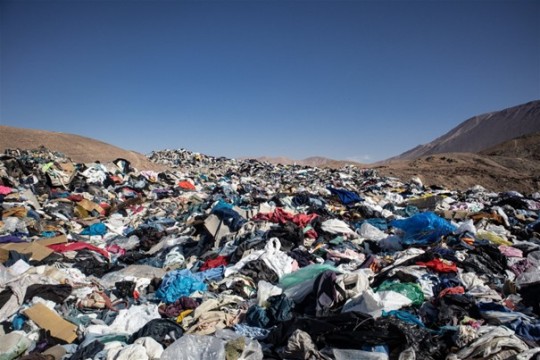
More than 100,000 tons of discarded clothing ends up in a desert in Chile
Europe is putting a stop to the throw-away culture through a ban on destruction[1] and a digital product passport with information about shelf life and repairability. No more mass destruction of clothing and other unsold merchandise.[2]
Every second in Europe, a full garbage truck of clothing is burned or dumped[3]. And every year, an estimated 11 to 32 million unsold and returned garments are destroyed. Europe has been wanting to reduce this gigantic waste for some time. The European Member States and the European Parliament reached an agreement to this end on Monday evening 4-12: Ecodesign for Sustainable Products Regulation[4]. The aim of the 'eco design law' is to make many products more repairable, reusable and recyclable. A product passport and a ban on destruction of unused goods are the key measures.
1. What is a digital product passport?
Consumers are already somewhat familiar with this: the energy label on refrigerators and washing machines gives an indication of their sustainability. That label (or product passport) has had an enormous impact on making those appliances more energy efficient.
The European Parliament and the EU member states now have an agreement to roll out the digital passport more widely and to deepen its content. First of all, almost all products on the European market will have to have such a passport: from car tires and steel to washing tablets and cosmetics to clothing or smartphones. The only exceptions are food, medicine, cars and weapon systems, for which there are separate regulations.
In addition to any energy consumption, the passport also contains information about the origin, composition, repair and disassembly options of the product. This should also make it easier to repair and recycle them. “People can know at a glance which product is the most durable or easiest to repair,” said MEP Sara Matthieu (Green), who was rapporteur in the negotiations.
2. What does the ban on destruction mean?
Initially, the ban applies to textiles. Globally, 92 million tons of textile waste are produced annually. A large portion of these are returned or unsold goods. In two years' time, they may no longer be destroyed, but must be reused or recycled. This ban will eventually be extended to electronics and electrical appliances. Massive quantities of these are also destroyed every year, especially cheaper items that are not sold or have been returned to the manufacturer.
The new rule goes hand in hand with stricter requirements for composition, repairability and disassembly of goods. The details will be worked out product by product by the European administration, but some guiding principles are a ban on adhesives, the absence of toxic substances, the obligation to have spare parts available and, above all, to offer them at an affordable price. The passport should eventually lead to a 'repair score', comparable to the energy label.
Matthieu (Green) expects a huge impact on the consumer market. 'Instead of offering disposable products for mass consumption, companies will offer many more services through robust devices. So to speak, you will no longer buy a washing machine, but an number of wash cycles.'
3. How comprehensive are the measures?
That depends on the control. The product passport is also an important instrument for this. Europe is counting on the famous 'Brussels effect': foreign producers will have to adapt their products if they want to maintain access to the gigantic European consumer market. Although the European consumer organisation BEUC[5] warns against loopholes. The organisation mainly sees a risk that international online platforms such as Amazon or Alibaba will circumvent the new law.
4. Is this agreement now final?
It has already rounded the most important cape. The agreement was finalised in the so-called trialogue negotiations between the European Parliament, the European Council and the Commission. Now it must be approved by Parliament and the Member States, but that counts as a formality.
Source
Lieven Sioen, Onverkochte kledij mag niet meer vernietigd worden in Europa, in: De Standaard, 6-12-2023, https://www.standaard.be/cnt/dmf20231205_96579697#:~:text=In%20eerste%20instantie%20is%20het,ze%20hergebruikt%20of%20gerecycleerd%20worden.
[1] Deal on new EU rules to make sustainable products the norm; https://www.europarl.europa.eu/news/en/press-room/20231204IPR15634/deal-on-new-eu-rules-to-make-sustainable-products-the-norm
[2] Read also: https://www.tumblr.com/earaercircular/722179599996534784/towards-a-circular-and-more-sustainable-fashion?source=share
[3] Read also: https://www.tumblr.com/earaercircular/723895455727157248/new-report-clothes-are-mercilessly-downcycled-or?source=share & https://www.tumblr.com/earaercircular/720260226679488512/hms-answer-about-the-dumped-clothes-article?source=share
[4] The proposal for a new Ecodesign for Sustainable Products Regulation (ESPR), published on 30 March 2022, is the cornerstone of the Commission’s approach to more environmentally sustainable and circular products. The proposal builds on the existing Ecodesign Directive, which currently only covers energy-related products. https://commission.europa.eu/energy-climate-change-environment/standards-tools-and-labels/products-labelling-rules-and-requirements/sustainable-products/ecodesign-sustainable-products-regulation_en
[5] The European Consumer Organisation (BEUC, from the French name Bureau Européen des Unions de Consommateurs, "European Bureau of Consumers' Unions") is an umbrella consumers' group, founded in 1962. Based in Brussels, Belgium, it brings together 45 European consumer organisations from 32 countries (EU, EEA and applicant countries). BEUC represents its members and defends the interests of consumers in the decision process of the Institutions of the European Union, acting as the "consumer voice in Europe". BEUC does not deal with consumers’ complaints as it is the role of its national member organisations.
3 notes
·
View notes
Text
The baby made a faint grunting noise before it did something unspeakable down the front of Sugafana’s shirt. Sugafana barely flinched. “I’ll be fine; I’ve done it before! Now if you’ll excuse me, I have to clean up and get this baby something to wear.”

When Sugafana’s street was flooded by human rebels trying to short out the circuits of headphone guards, she didn’t take much. Just the essentials: a blanket, her water refillable condensation bottle, and her mother’s box of wedding jewelry. She also took her roommate.
“Afternoon, Nani,” Sugafana greeted her grandmother as she pushed aside the curtains that gave their small cave a tiny bit of privacy. Home was two rolled-up sleep mats on the floor with bedding, a box filled with clothing, and a small hissing and spitting machine standing in the corner. Natural grooves and holds in the lava stone walls had been used to display jars filled with buttons and thread. An embroidered tapestry depicting a little girl holding a cat hung from the ceiling.
“You’re back early,” Nani remarked, barely looking up from a dress shirt she was busy repairing.
“Yes, I found something expensive on the field,” Sugafana admitted, and Nani looked up, her hand still instinctively stitching away at the shirt's tear. Looking at Nani was like looking into her future. They both had the same round faces, amber eyes, and warm beige skin. Nani’s eggplant purple hair, however, had long ago turned ashy white with faint streaks of black. Her suspicious eyes were now surrounded by thick lines.
“You found a baby,” Nani said flatly, as Sugafana gently placed the baby in the center of the sleep mat.
“I found a maternity droid and sold it to Bappa; the baby was locked inside,” Sugafana replied as she shed her filthy shirt, switching it for a plain black blouse.
“We can’t keep a baby! I barely have time to keep up with all the clothes people drop off, and you’re out working twelve hours a day,” Nani grumbled. Many of the refugees in the camp had spent decades using A.I. appliances to clean and repair their outfits. Most of them found washing their socks baffling and panicked at the thought of torn trousers. Thankfully, before the war, Nani had worked as a historical preservationist at the Museum of Ancient Textiles.
“I never said I was keeping her, Nani! I’m taking her into the city to find her family,” replied as she grabbed an old scarf, wrapping it around the baby's bottom like a makeshift nappy.
“The city,” Nani said flatly, “It’s not like this camp has genetic testing pods lying around,” Sugafana pointed out. “We avoid the city for a reason!” Nani said, tapping her legs.
Nani’s legs hadn’t worked right since she caught Martian Polio as a child. The machines insisted that those who couldn’t run to generate power had to be “recycled.”
“I’ll be fine, Nani! I go to the city's teleportation pod every week for ice deliveries,” Sugafana said firmly, and Nani sniffed, glancing down at the baby.
“Odd little thing, isn’t she? Her hair is green! You don’t see that much around here,” Nani remarked.
“No, you don’t,” Sugafana admitted. Almost everyone she knew had hair that was either black or in various shades of deep purple. Green hair belonged to tourists from the outer planets. The baby's skin, however, was darker than hers, and she stirred slightly, her eyes opening a crack, revealing black eyes.
“She’ll need feeding,” grunted Nani, turning to the spitting machine in the corner. The Creatrix was an essential household item that could be found in almost any home. Using electrified sand from the moon of Titan and computer codes, it had the ability to generate almost any inorganic material. Sugafana’s Creatrix was a small portable camping one that her grandfather took on hiking trips. It couldn’t create clothing and only had fifty recorded codes, but it had its uses.
“I’m sure the machine still has the baby formula codes in it; we used to make bottles for your sister when she was tiny,” Nani remarked, and Sugafana pursed her lips together.
“Then that means those codes are at least twenty years old,” Sugafana pointed out, refusing to think about her sister.
“Codes are codes! You’ll need four bottles for a trip into the city and back, and an ever-cleaning nappy! Not a filthy scarf,” Nani said, scooping four cups of glittering black sand out of a flour bag.
“You need that sand for your pain tea, Nani!” Sugafana protested, and Nani waved her away with annoyance before punching in several numbers.
“I can handle leg twitches! You won’t be able to handle a screaming, filthy newborn,” Nani said firmly.
“Fine! But as soon as I get back, we are packing to head to Harris Park, and you will need to drink four cups of tea for that journey,” Sugafana said as Nani handed her an ever-cleaning diaper. Sugafana still remembered dressing her baby sister in one when she was ten years old. The diapers were supposed to clean a soiled baby automatically forever, but they tended to break down after a few weeks.
3 notes
·
View notes
Photo
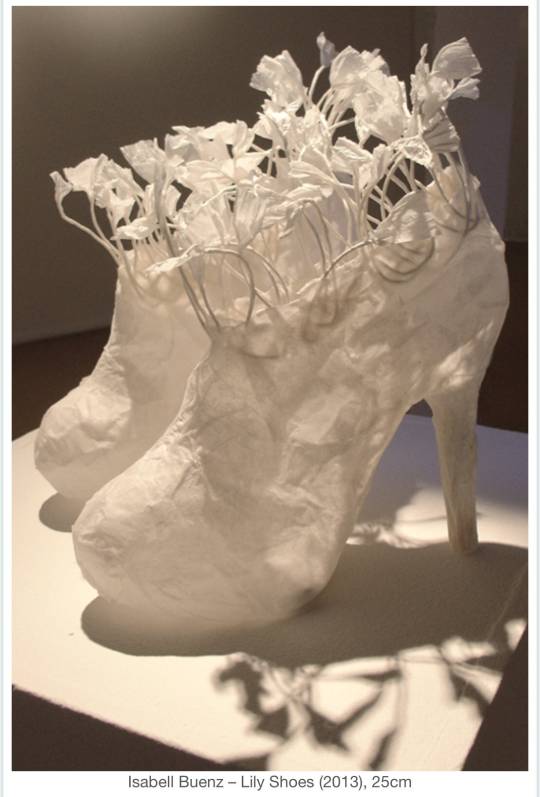
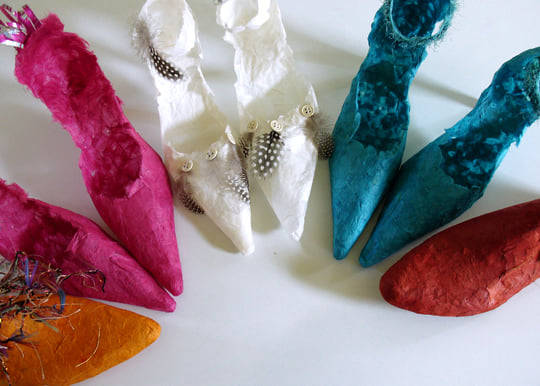

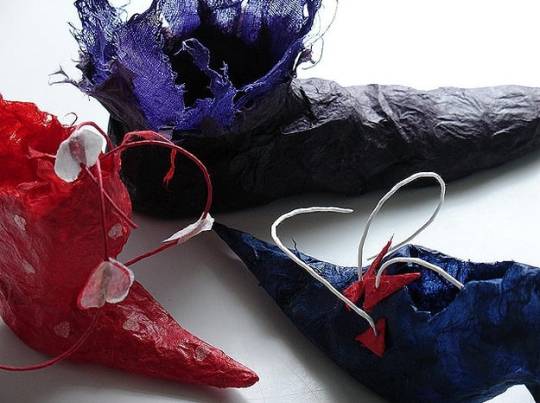
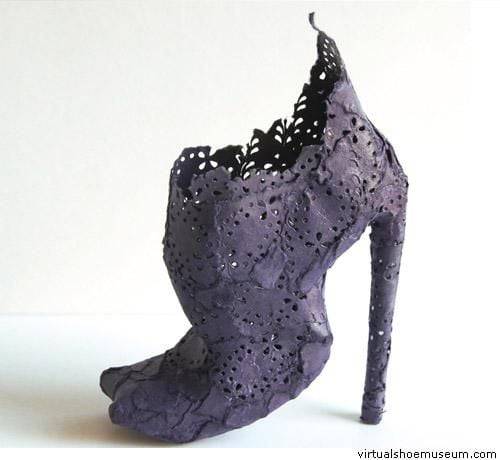
Isabell Buenz – magnificent paper textiles and shoes :
"My Dad’s work in the local newspaper has always captured my imagination. When he worked for the local newspaper we always had big rolls of waste paper in the house. Early on I became fascinated with the idea of making all sorts of things from paper and discarded newspapers. I still have one of my first craft books: ‘Basteln mit Zeitungspapier’ which I bought in 1975!I also started designing and making my own clothes after a school sewing project.
It had never occurred to me before that you could make your own outfits. Initially, I made my clothes using my granny’s indestructible Singer sewing machine. When I was a teenager my parents finally bought our very own electrical machine. I started making my Mum’s evening dresses and showed her how to sew too."
17 notes
·
View notes
Text
The shop smells of Mr. Brimsby’s exotic cologne, and the dusty fibrous odor of textiles, and the sweet rot of cut flowers, left in their water a day too long. The thick air sticks to the inside of their nose, and they feel almost lightheaded as the tailor whirls around them. Bolts of fabric are pulled from the wall, spools of ribbons and intricate trimmings blurring as they pass, and Maudlin stands in the middle of it, head spinning.
A swatch of something soft and shiny is thrown over their shoulder, and Brimsby asks, Thoughts? and before Maudlin can open their mouth, Madam Edwards is lifting an elegant hand and saying, Too busy, and the sample is whisked away.
While the tailor rummages through drawers of buttons, glistening like jewels, Madam Edwards sips her tea, and makes conspiratorial eye contact with Maudlin over the rim of her cup. For a second, her brows crease, and then she sets her tea down and rests her hands in her lap. Still looking at Maudlin, she takes a deep breath, the fabric at her collar rising and falling slowly, before nodding slightly in their direction
Maudlin repeats after her, taking their first purposeful breath in what feels like years.
Mr. Brimsby reappears, then, holding out a roll of golden lace for her to inspect, speaking at length on its country of origin and method of construction. Madam Edwards darts a glance towards it, then back to Maudlin, humming her appreciation for the salesman’s education. Then, very subtly, they watch as she sets her shoulders back, lifts her chin, and raises her eyebrows at them.
With all the grace and fluidity of a rusted machine, Maudlin drops their shoulders like they watched Madam Edwards do, and stands as straight as they can, still taking slow, heavily perfumed breaths.
���and I don’t need to tell you that Serkonan silk is of the highest—
The tailor is talking on, and already Maudlin’s lower back hurts from the unfamiliar posture, but Madam Edwards is smiling at them.
Amruta Edwards is the one thing in the tailor’s shop, perhaps the one thing in all of Dunwall, that remains still and steady under Maudlin’s often wavering gaze. Surrounded by a flurry of color, she sits perched on the edge of a tufted parlor chair, a black-wrought statue of discernment personified, picking up her teacup in one hand and saucer in the other. Watery sun through the shop window at her back, Maudlin watches as she finally manages to interrupt Mr. Brimsby’s lecture.
“Yes—thank you—however, I’m not going to be the one wearing it.” And Maudlin is wrenched back into focus.
In front of them, Mr. Brimsby is holding out a bolt of black silk, dotted with small embroidered golden stars. They lift their hand to it—conscious of the calluses and of the grime that refuses to be scoured away—and rub one of the the stars between their fingers.
Instinctively, they look back up at Madam Edwards.
In a city that is all too much all too often, she is there, with a gentle touch, a commitment to proper meals and getting home safe, and a dedication to decency in the face of absurdity. She says, “What do you think, Maudlin?” in a voice like warm tea, with a drop of something stronger in it.
Maudlin exhales, almost a laugh. “Beautiful. All of it…beautiful.”
3 notes
·
View notes
Text

froy gutierrez . cis man . he/him ➶ DID YOU SEE THEM ?! they’re finally back as a MENTOR, and you know they’re one of my favourites ! it’s DAMI LORENZ , the TWENTY ONE year old WINNER of the NINETIETH hunger games! i’m just so excited to see them returning to the capitol all the way from DISTRICT EIGHT! they won their games using A TWO HANDED MACE so their tributes will no doubt be desperate for their wisdom. the capitol just loved them for being so CHARISMATIC , even if they have been known to be SELF DESTRUCTIVE at times. they DO have a relative in this years games ( younger brother ) and they DIDN’T volunteer to go into the arena with them . ( character IS part of the uprising )
LOADING PANEM CITIZEN NO.90127839372... D. LORENZ, EIGHT. ███████▒▒▒ 50%
full name: dami orland lorenz age: twenty one district: eight, textiles gender: cismale pronouns: he/him sexuality: homoromantic homosexual victor year: ninetieth mentor status: active public reception: well favoured for an outlying district. medical conditions: r̸̡̠̺̈́͠e̵̢͉͚̒͌̔d̸̪͇͎͒̾̚ä̸͎̺̘́̀͠c̵̻̙̓͒̽t̴͖͇̪̽̀͒e̴̞̦̐̔͐d̸͓͙̙͒͌͊ height: 5′7″ parents: CITIZEN NO. 1877292334; alfons lorenz, CITIZEN NO. 9812773831; jesleen lorenz. (deceased) siblings: CITIZEN NO. 90128612360; iscar lorenz (tribute of the ninety fourth hunger games)
FILE CORRUPTION. SEEK HELP FROM AN IT SPECIALIST.
dami’s story isn’t much different from any other boy in eight. growing up in the streets of the factory-based district, in a cramped tenement building. his mother worked as a seamstress, his father working as a deliveryman that hauled large rolls of fabric from one destination to another. many described the work of the district as ‘beauty in the making’, but there’s no beauty to be had in a district that has smog so thick that at times it’s hard to breathe, where people getting caught in large machines that tore limbs from them because they were stupid enough to go under it to fetch something that rolled under whilst it was running. behind the sequins, behind the glorious colours, there was blood-- much like any place within their horrid country.
dami was taught from a young age, again like any child of the district, to fear the reapings. seeing children that he knew from passing being called, shipped off to a capitol to watch them wind up as nothing more than another ‘fallen tribute’ that had nothing more than their picture in the sky at the end of the day to then be forgotten moments later by the capitol residents. the hunger games weren’t something glorious, no matter how the vile dogs of the city tried to tell them that it was something to be honoured to be chosen for. many teens put their name in more times for tessera, but thankfully dami was warned by his father that “if you ever put your name in for that, i’ll knock you silly myself and you won’t even see the reaping.” he was protective of his family, especially after losing an older sister to the games for the same reason.
it’s why his blood ran cold when his name, out of the entire district was only in the bowl seven times, it rang out through the air as clear as day. his father? was distraught. his mother? couldn’t even make it out of bed, battling a terrible cough that had been plaguing her for close to a year now that had left her bed bound, one that would claim her by the time of his eventual, yet still unknown, return to the district. dami thought that when he had said goodbye to his father and brother that it was the last time he was ever going to see them. dami lorenz was going to be fodder, a lamb to the slaughter who would be forgotten like a flash in the pan. or so he thought.
once he was in the capitol, he realised that it was all a game-- pardon the pun-- one that started the second they’re presented to the public on their chariots in the parade. “if you want to survive, make people fall in love with you.” and that’s what he tried to do, to the best of his capabilities. he was always good at compartmentalising himself, hiding pain and terror behind a smile for others benefit. he learned to charm a crowd in his short time in the city, learned how to make an audience laugh with a wink, a grin and a giggle. “the handsome boy next door” was his angle, and it worked. true, he didn’t score well with a seven, but he had won hearts. and hearts meant sponsors. all of which would do jack shit once he was let loose in the arena.
the area was made of a ruined city, rubble, and large buildings with plenty places for people to hide. in books of ancient history, there were tales of a place known as “pahrys”, or something close to that spelling (dami never stuck in at school, he had a factory to start working in at the age of ten). although laying in ruins, it wasn’t something unfamiliar to him-- almost like home. and it played to his advantage, able to weave himself through narrow streets and alleys to dodge careers and wandering stray tributes that thirsted for blood for their own victory.
the games lasted 7 days, a whole week. towards the end, as views began to dwindle, the game makers knew that they had to pull their last card to draw people back in. and armed with a large mace that he had found in his mad dash in and out at the start of the games, dami heard loud explosion after explosion from above. bombs being dropped one by one, sending ruined buildings tumbling down more and more and forcing those that were wise enough back to the cornucopia. he was against the girl from one in the end, down to the final two, and by god was she chomping at the bit to slaughter him. no, i’ve come this far. i’m not giving up. i can’t. i can’t. i can’t. i can’t--
he wasn’t sure when he came back to reality, but when he did, he was standing over the mangled corpse of the girl that had been hungering for his demise, her head nothing more than a pile of bone and gore splattered against the pavement. a final cannon rung out through the air: he’d won. the scream that ripped from his throat was edited out by the game makers. it took him hours to come out of a state of shock, hyperventilating at the brutality that he had not only endured by the brutality he’d inflicted. he was a monster. he’d survived, but he was a monster.
although it happened four years ago, dami’s public image remained the same. the charismatic, broad shouldered boy next door with the friendly smile, with the gentle eyes and the sing-song laugh that could please a crowd. but the second that a camera isn’t on him, the second that he isn’t being shoved in the faces of the people that made him do what he had to do to survive, he finds ways to numb the constant terror that he feels in his heart. loud noises set him on edge, at times enough to send him to the ground clinging to his ears and rocking back and forth. he’s broken, but if he can aid a cause such as the rebellion in whatever little way he can to make sure that others, least of all his brother, have to face the same fate as him? then he will.
2 notes
·
View notes
Text
Square Profile Bar - Everything Need To Know
Square Profile Bars are steel rods that are mainly used in auto and construction projects. The stainless steel square profile bars are anti-abrasive and anti-corrosive which makes them appropriate for joints in commercial medical environments. Preferred applications of square profile barsinclude mounting decorative ironwork, gates, and safety barriers around establishments.
If you are in search of stainless steel square profile bars of the highest quality, please look no further. Matta Drawing Works is India’s leading manufacturer of highly durable stainless steel square profile bars in dozens of grades and sizes, including 304l, 316l, and 303.
What is a square profile bar?
A square profile bar, also known as square steel, squares, and the square metal bar is a multipurpose steel section highly used for manufacturing and repairs. The general-purpose square profile bar is a part of our light and re-rolled section, making it suitable for most commercial projects.
If you are looking for great quality Stainless Steel square profile bars then you have come to the right place. We are equipped with a variety of grades, sizes, and finishes to suit all your requirements whether you are a commercial business owner or a domestic customer. Matta Drawing Works is the No.1 provider of square profile bars and other products, in Grades 304, 316, and 303, providing a cutting service with a quick turnaround and 1st class polishing service.
What Makes Stainless Steel Square Profile Bar Irreplaceable?
Several reasons make stainless steel bright square profile bar irreplaceable. Whether concrete, wood, or other synthetic fibers are found in the surrounding area, the anti-corrosion qualities, durability, strength, and dependability make the stainless steel square profile bar remain unmatched. The size of the square profile bars determines its application space. These bars have a wide range of uses and are available in various grades.
Some Major Properties Of Stainless Square Bar
● Strength to withstand any physical or chemical conditions.
● High resistance against extreme climatic conditions.
● Cost-effective as well as durable.
Features
The Stainless Steel square profile bars are used because of the high strength of the bar. The square shape is geometrically stronger and is able to handle stress more than the round bars. Therefore, the material is used in pressure vessel applications and general corrosive services under specifications like the ASTM A276 Stainless Steel 316 squareprofile bar. The different polishes such as the bright, black, and polished square profilebars give them unique application abilities. The weight of the material depends on the width, diameter, length, and density of the grade of material used. The 304 and 316 grades of square profile barshave 8 grams per centimeter cube density. Major features of square profile bar include,
● High tensile strength
● 100% purity level
● Unmatched quality
● Superior performance
● Long work life
● Chemical resistance
● Corrosion resistance
Square profile bars made out of stainless steel, a strong and sturdy metal resistant to corrosion. They are also used for many purposes due to their flexibility and how easily they can be shaped.
Applications
Square profile bars is a solid metal bar that has a square cross-section. They are widely used in multiple industries for general assembly or manufacturing. Square profilebars are also used for general repairs of plant equipment and railings. Common applications of square profile barsinclude ornamental ironwork, gates, and protective barriers on windows. Other applications include,
● Automobile industries
● Machining equipment
● Machining Tools
● Heavy engineering
● Textile industries
● Fasteners
Conclusion
Matta Drawing Works is a stainless steel bright square profile bar...
2 notes
·
View notes